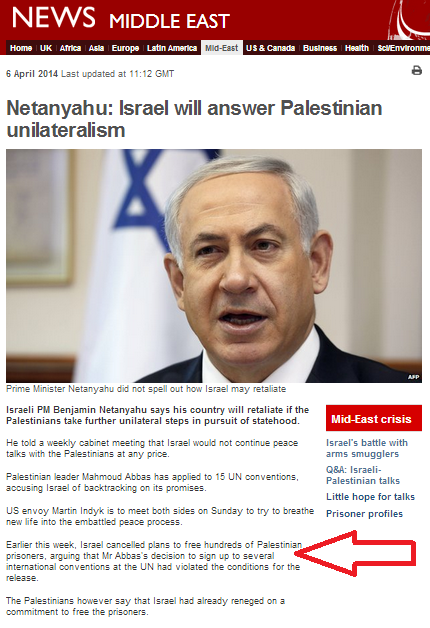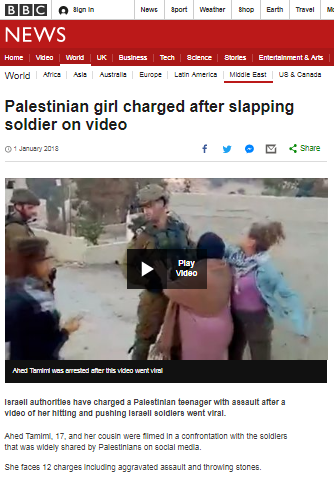Another day: another BBC article on the subject of the stalled talks between Israel and the PLO which does little to inform BBC audiences of the complete background to the current impasse.
Having covered the subject in five previous reports published throughout the ten days between March 26th and April 4th (see related articles below), the BBC News website published an additional report on April 6th titled “Netanyahu: Israel will answer Palestinian unilateralism“.
Based on remarks made by Israel’s prime minister at the weekly cabinet meeting on the same day, the report has little to contribute to audience understanding of the topic. Like its predecessors, this article fails to fully inform audiences of the background to the story, preferring instead to once again present an equivocally framed picture of events.
Bizarrely, it was claimed in the original version of this report that: [emphasis added]
“Earlier this week, Israel cancelled plans to free hundreds of Palestinian prisoners, arguing that Mr Abbas’s decision to sign up to several international conventions at the UN had violated the conditions for the release.
The Palestinians however say that Israel had already reneged on a commitment to free the prisoners.”
In fact, twenty-six releases – not “hundreds” – were scheduled for the end of March (dependent upon progress in the talks – of which there was little), with 78 prisoners having already been freed in the previous three tranches under the terms of the agreement which preceded the return to negotiations.
“Under the terms of the agreement last July that enabled the current round of negotiations – which is set to expire on April 29 – Israel was to release 104 Palestinian security prisoners in four phases, and the Palestinians were to refrain from unilateral moves in the international arena.”
The BBC appears to have conflated the original July 2013 agreement with an offer (which, ironically, it has so far failed to report) made by Israel to the US Secretary of State in order to encourage the Palestinian Authority to continue negotiations after the April 29th dead-line which was publicized on the morning of April 1st. Inter alia, according to the terms of that offer, in addition to the fourth tranche of 26 prisoners:
“Israel would release an additional 400 Palestinian prisoners during the continuing negotiation period. These prisoners would be picked by Israel, include many minors and women, and not include those with “blood on their hands.” “
That offer was however rendered irrelevant by the Palestinian president’s live televised signing of applications to join assorted UN agencies on the afternoon of the same day – in violation of the July 2013 agreement which preceded the recommencement of negotiations, in which the PA committed to not applying to the UN throughout the period of talks scheduled to close on April 29th.
The BBC’s failure to clarify to audiences that Abbas’ signing of the UN applications did indeed violate the terms of the agreement reached before the talks recommenced – and its framing of that issue as an Israeli claim alone – is clearly as misleading to BBC audiences as its gross inflation of the number of prisoners scheduled for release.
The latter point has meanwhile been corrected following a complaint made to the BBC News website’s Middle East desk by a reader, to which the following response was received.
“We have corrected the story and published a note at the end explaining the changes. We are grateful to you for pointing out the mistake and apologise for the error.”
On April 7th the paragraph concerned was amended and another added. That section of the article now reads:
“Earlier this week, Israel cancelled plans to free a final batch of Palestinian prisoners, arguing that Mr Abbas’s decision to sign up to several international conventions at the UN had violated the conditions for the release.
The Palestinians however say that Israel had already reneged on a commitment to free the prisoners.
Israel has so far freed 78 prisoners in three rounds of releases – part of a deal under which both sides agreed to resume peace talks last July.”
A footnote was appended to the report.
One does have to wonder how such an obvious factual inaccuracy managed to slip past fact checking and editorial processes.
Related Articles:
BBC already setting the scene for ME talks collapse
BBC continues to present an incomplete picture of Israel-PLO talks
BBC’s selective omissions slant audience view of Israel-PLO talks
BBC opts for equivalence in report on talks breakdown
Crucial background to floundering of ME talks still outside the BBC’s frame





